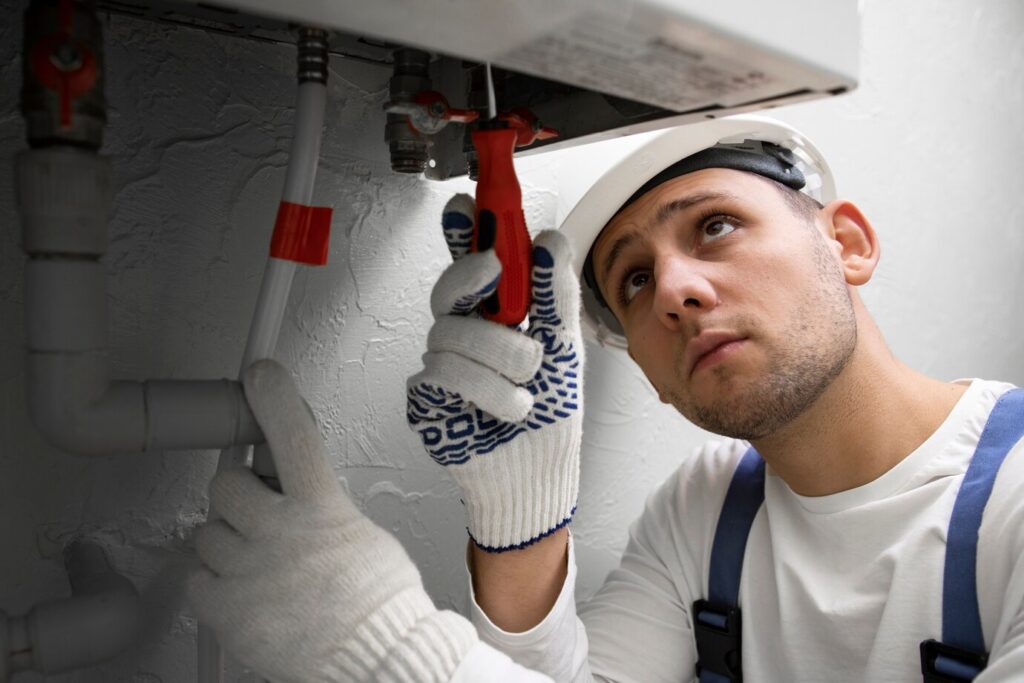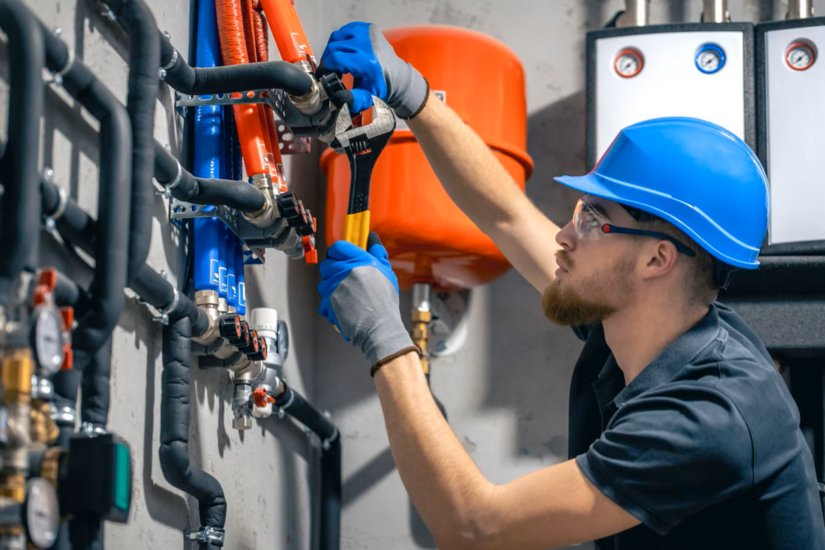Working with gas isn’t something to be taken lightly. Whether you’re fitting a boiler, repairing a gas appliance, or installing pipework in a new build, having the right tools in your kit is crucial – not just for doing the job right but for doing it safely.
This guide is for beginners entering the world of gas engineering. We’ll go through the tools, materials, and gear every new gas engineer should know about before hitting the field. From the basics to the more advanced equipment, this article covers everything you need to build a reliable, professional toolkit.
Who Is A Gas Engineer?
Responsibilities vary but can include:
- Fitting and testing gas lines
- Servicing gas boilers and heating systems
- Troubleshooting leaks or malfunctions
- Ensuring installations meet safety regulations (e.g., Gas Safe Register in the UK)
Whether self-employed or part of a bigger company, gas engineers play a vital role in keeping homes and businesses running safely and efficiently.
Core Tools Every Gas Engineer Needs
Measuring and Diagnostic Tools
- Manometer: Used to measure gas pressure in a pipe or appliance. You’ll need it for testing tightness, checking working pressures, and compliance with standards.
- Multimeter: Gas engineers need to test electrical connections on boilers and control systems. A multimeter helps diagnose faults and check the power supply safely.
- Gas Leak Detector: Electronic gas sniffers are a must have. They can detect even the smallest gas leaks that aren’t always visible during a visual inspection.
- Thermometer: Flue gas temperature, surface temperatures and water temperatures – all play a part in system efficiency. Digital thermometers are fast and accurate.
- Spirit Level: Simple but essential. Whether it’s pipework or mounting a boiler, a level ensures everything is aligned and professional looking.
Pipework and Cutting Tools
- Pipe Cutters: Clean, straight cuts on copper or plastic pipe without the mess of a saw. A basic rotary cutter is a good starting point.
- Pipe Cutters: Clean, straight cuts on copper or plastic pipe without the mess of a saw. A basic rotary cutter is a good starting point.
- Deburring Tool: After cutting the pipe, smoothing the inside edge is crucial to avoid turbulence and ensure solid joints.
- Pipe Bender: Used to shape copper pipes without causing kinks or flat spots. Manual or spring benders are ideal for beginners.
- Hacksaw: While pipe cutters are preferred, a hacksaw is handy for cutting through tougher materials or old fittings.
- Adjustable Wrenches & Stillson Wrenches: These allow you to grip and tighten pipe fittings, valves, and connections. A range of sizes is useful.
- Spanners And Sockets: For working on boilers and appliances, especially in tight or awkward spots.
Installation And Connection Tools

- Blow Torch and Gas Canisters: Used to heat joints for soldering copper pipes. Many gas engineers prefer self-igniting torches for speed and ease.
- Flux And Solder Wire: Needed when making soldered joints on copper pipes. Clean surfaces, flux application and good technique = leak free results.
- PTFE Tape: Wraps around threaded joints to help create a gas-tight seal. Used on compression fittings, valves, and appliance connections.
- Compression Fitting Tools: These include spanners and grips that help make leak-free joins on compression pipework without heat or soldering.
Advanced Tools For Long-Term Use
- Flue Gas Analyser: For checking boiler emissions, verifying combustion efficiency, and safety. Essential for official reports and certificates.
- Combustion Analyser: Goes hand in hand with the flue gas analyser. Deeper diagnostics for gas-burning appliances.
- Pressure Testing Pump: A hydraulic tool to check for leaks in pipework before appliances are connected. Confirms system integrity.
- Endoscope Camera: Lets you see into tight, hidden areas without cutting into walls or ceilings. Saves time and damage.
- Thermal Imaging Camera: A more advanced tool for finding hidden heat loss, blocked pipes, or faulty appliance components.
Common Materials Gas Engineers Work With
Pipes And Fittings
- Copper Pipe – Standard for domestic gas systems
- Plastic Pipe – Easier to work with in some installations (check regulations)
- Elbows, Tees, Couplers – For directing and splitting pipe runs
- Isolation Valves – For shutting off during servicing
Sealants And Consumables
- PTFE Tape
- Solder Wire & Flux
- Sealants (e.g., gas jointing paste)
- Cleaning Wipes and Cloths
- Gaskets – For boiler servicing and appliance installs
Fasteners And Support
- Pipe Clips and Brackets – For neat and safe pipework
- Wall Plugs & Screws – For mounting appliances and fixtures
Safety Gear And Protective Equipment
- Gas Safe ID: You must be certified and registered before working with gas in many areas.
PPE (Personal Protective Equipment)
- Gloves – Heat and cut resistant
- Safety Goggles – For soldering or drilling
- Steel-toe Boots – For heavy-duty site work
- Workwear – Durable clothing, often flame-resistant
- CO Detector: For confined spaces or when testing appliances.
- Fire Extinguisher: When soldering or in tight spaces near flammable materials.
- Ventilation Fan: For increased air flow in enclosed areas and reduced fume inhalation.
- First Aid Kit: For minor on-site injuries.
Organising Your Toolkit
- Tool Bags or Toolboxes: Choose something rugged with multiple compartments. Waterproof bases are ideal.
- Tool Belts: Keep essentials like tape, a cutter, and a wrench at your side.
- Rolling Tool Cases: Great for site visits, especially if you need to carry analyzers and power tools.
- Small Parts Storage: Keep washers, fittings, screws, and gaskets from getting lost.
Staying Compliant And Professional
- Digital Tools & Apps: Allow you to fill out gas safety certificates, job reports, and customer invoices easily.
- Job Sheets and Checklists: Helps ensure no steps are skipped during installation or maintenance.
- Installation and Servicing Certificates: These may be required by law depending on the job.
- Technical Manuals or Standards Books: Handy for quick reference when dealing with unfamiliar systems.
Optional But Useful Tools For Beginners
- Laser Level – Accurate pipe runs and appliance installation
- Cordless Drill – Speeds up wall bracket or fixing installations
- Torque Wrench – For consistent tightening on valves and fittings
- Work Light – Improves visibility in dim or enclosed areas
- Magnetic Tray – Holds small screws and fittings safely
Final Tips For New Gas Engineers
- Don’t buy everything at once, build your toolkit as your jobs grow
- Focus on quality over quantity
- Keep tools clean and regularly serviced
- Stay up to date with regulations and training
- Join trade groups or forums for shared tips and tool reviews
Conclusion
Gas engineering requires a unique blend of mechanical skill, problem-solving, and safety awareness, and none of it works without the right tools. Whether you’re just starting out or building up your professional kit, investing in the essentials will give you the confidence to work smarter, safer, and more efficiently.
This guide is your foundation. As your career grows, so will your understanding of what tools suit your style, your projects, and your pace. And remember, when it comes to working with gas, preparation isn’t just helpful, it’s critical.
Frequently Asked Questions
Beginner gas engineers should start with a solid set of core tools including a manometer, pipe cutters, multimeter, GS38 Compliant Voltage Indicator, adjustable wrenches, blow torch, and a gas leak detector. These cover basic diagnostics, pipework, and safe installations.
While not always essential at the very start, a flue gas analyser becomes necessary for boiler servicing, efficiency checks, and issuing certificates. It’s a key investment once you begin working on gas appliances regularly.
Gas engineers should wear gloves, safety goggles, steel-toe boots, and flame-resistant clothing. A carbon monoxide detector and fire extinguisher should always be on hand during installations and repairs.
Plastic pipes can be used in certain applications, but copper is the industry standard for most domestic gas work. Always check local codes and manufacturer guidelines before using alternative materials.
Use toolboxes or tool bags with compartments, small parts organizers for fittings and consumables, and label your tools if working in shared environments. Good organisation saves time and improves safety on the job.



